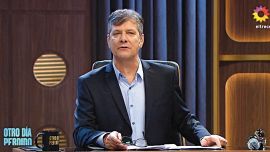In one of the Polo Obrero social organisation’s most recent marches, there was a moment that barely registered with the media. A large group of federal security forces intercepted a march of the picketers branch of the Partido Obrero party that was trying to make it to Puente Pueyrredón. The operation stopped the demonstration nearly two blocks before it arrived at the thoroughfare leading into Buenos Aires City. There would be no roadblocks. Polo Obrero, carrying large banners and with hooded militants in the ranks, had to be content with protesting on a nearby street in Avellaneda.
There will be more examples of this in the coming weeks. Argentina’s Security Minister Patricia Bullrich is convinced she must deepen her ‘anti-picket’ protocol and policy. Even if there are more marches, the official’s guideline that roads, motorways and access points must not be blocked – and that protesting must take place “on the pavement” whenever possible – is more in force than ever.
What’s more is that during the reserved dialogues Bullrich has been holding with President Javier Milei, security policy has become one of the cornerstones of the La Libertad Avanza’s administration. Any chance he gets, whether in public or in private, the head of state extols the work of “Ms Bullrich” (as he always calls her). He has empowered his former presidential rival and the nation’s federal forces to take control of the streets.
Against that backdrop, the Security Ministry is observing and expecting a scenario of greater social conflict in the next few months. There is an order not to talk to social organisations, left-wing parties and unions that demonstrate. That work, in the case of Buenos Aires City, falls to City Security Minister Waldo Wolff, and Diego Kravetz, the chief of the capital’s police force.
“Patricia has always been very clear: roadblocks are a crime and we’re going to comply with that. Federal forces have an order to prevent roadblocks and we’re giving them all the power to act accordingly,” a top source close to Bullrich explained to Perfil.
Bullrich has also been talking to her fellow Cabinet member, Justice Minister Mariano Cúneo Libarona, about a topic that worries her: the slowness, in some cases, of court proceedings.
In particular, the fact that when the security forces arrest someone during marches or attempted roadblocks, the courts must decide whether to incarcerate them or release them then and there. At most, the forces can stall a decision. Another complaint is that some activists during protests have claimed to be journalists, while some detainees challenge orders that see them detained in police vehicles during rallies.
The Security Ministry is also already assessing other likely scenarios. For instance, a much larger march including a roadblock. Bullrich’s idea, which she has been working on in coordination with Wolff, is to limit the number of roadblocks, especially preventing the halting of traffic on avenues, and for the deployment of forces to be shared on the basis of two or three rings, with each force alternating positions.



















Comments